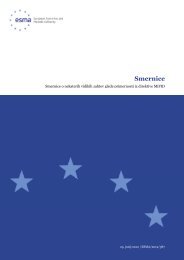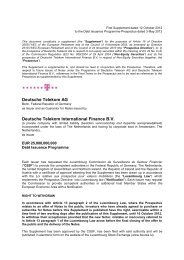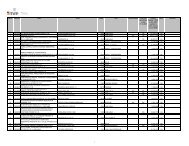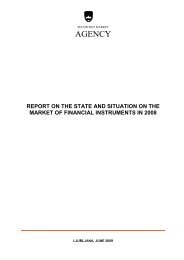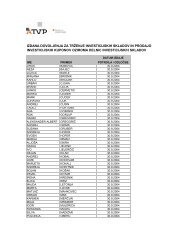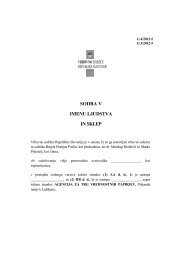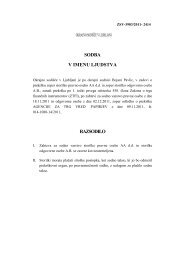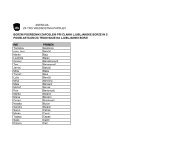Prospectus-Final (clean) - Malta Financial Services Authority
Prospectus-Final (clean) - Malta Financial Services Authority
Prospectus-Final (clean) - Malta Financial Services Authority
- No tags were found...
You also want an ePaper? Increase the reach of your titles
YUMPU automatically turns print PDFs into web optimized ePapers that Google loves.
a decrease in Deutsche Telekom's revenues and may impact the extent and timing of the NGA buildout.Fixed and Mobile Termination Rate RecommendationThe European Commission recommendation on relevant markets from 2007 requires NRAs to analysethe call termination market in order to determine whether regulatory remedies need to be imposed.The European Commission intends to further reduce termination rates significantly. In May 2009, theCommission issued the recommendation on the regulatory treatment of fixed and mobile terminationrates in the EU that defines details for the cost calculation of termination rates by the NRAs. With therecommendation, the Commission intends to harmonise cost standards for mobile termination ratesthroughout the EU. In this respect, the EU Commission stated the intention to reduce termination ratesfrom EUR 0.03 to EUR 0.015 per minute by the end of 2012, while also eliminating asymmetrybetween operators. Although the recommendation is not legally binding, NRAs have to take the utmostaccount of the recommendation while still being able to reflect national circumstances. Mobileoperators could therefore be subject to further pressure to lower termination rates in the future, whichmay have an additional negative impact on Deutsche Telekom's revenues.German Fixed-Network Telecommunications RegulationGerman telecommunications regulation has a particularly significant impact on Deutsche Telekom'sbusiness due to the size of its operations in Germany. As in all EU Member States, Germantelecommunications regulation is based on the EU Framework. German telecommunicationsregulation is mainly derived from the German Telecommunications Act (Telekommunikationsgesetz).Deutsche Telekom believes that, for the foreseeable future, the Federal Network Agency is likely toview Deutsche Telekom as a provider with significant market power in various German markets forpublic voice telephony services in the fixed network and in other markets, including most of those inwhich Deutsche Telekom helds monopoly rights in the past. Additionally, it has been determined to bea provider with significant market power in the German market for mobile voice call termination.Deutsche Telekom expects that the strict regulatory provisions of the German TelecommunicationsAct relating to providers with significant market power will be applied to its activities in those marketsalso in the future. Considering that in many markets Deutsche Telekom's competitors are unlikely togain significant market power in the near future, Deutsche Telekom expects that it will have tocompete in important markets with providers not subject to those regulatory obligations. Therefore,these competitors may have more flexibility than Deutsche Telekom has in terms of the selection ofservices offered and customers served, pricing and the granting of network access.Under the German Telecommunications Act, tariffs for telecommunications access services offered byproviders with significant market power and their affiliates can be subject to price regulation, insofar asthe tariffs relate to a market in which significant market power has been determined to exist. Othertariffs are essentially unregulated. The tariffs of all providers in Germany are, however, subject togenerally applicable EU and German laws, including competition and consumer protection laws.In January 2010, the Federal Network Agency determined that Deutsche Telekom is a provider withsignificant market power for the access market. The agency included all-IP accesses to this marketfor the first time. Simultaneously, Deutsche Telekom was required to enable call-by-call and preselectionfor this type of access. For this market, the Federal Network Agency affirmed the ex-postregulationand imposed on Deutsche Telekom the obligation to provide a resale offer on the terms ofDeutsche Telekom's retail-tariffs for every respective type of access.In a provisional decision on 2 April 2012, the Federal Network Agency rejected a VDSL price modelpresented by Telekom Deutschland in ex-post control proceedings. The model, which has becomeknown as the VDSL contingent model, provides for attractive prices for the VDSL wholesale product inreturn for an upfront payment for a minimum number of lines. On account of the EU-wide consultationon this provisional decision, the final decision is not expected until June 2012. Rejection of this modelby the Federal Network Agency does not augur well for the broadband roll-out in Germany. It impedescooperation models such as the network partnership agreed with NetCologne. Thetelecommunications industry has always stressed that partnerships and risk-sharing are vital for thebroadband roll-out. Voluntary agreements within the industry not only allow companies to share therisk for network investments, but are also in the interest of customers.56



